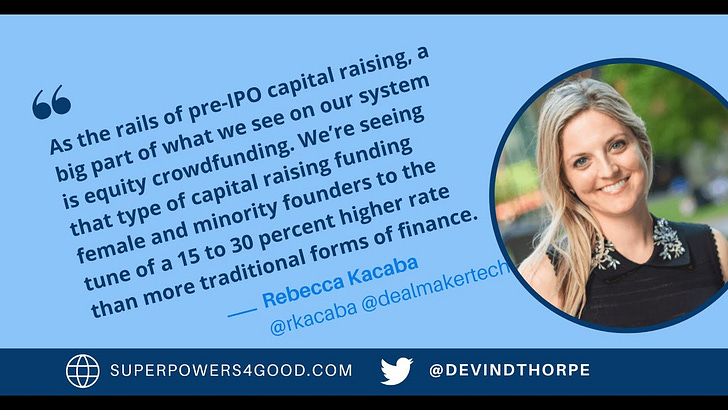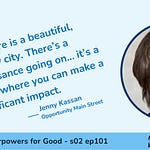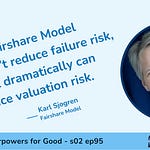Devin: Rebecca, what is your superpower?
Rebecca: It’s an interesting question. If I were to put it in a word, it would be “storm.” So the ability to create the storm and then the ability to have calm once the storm is brewing all around you.
Mark, what is your superpower?
Mark: My father was a theater professor, so I grew up deeply immersed in the theater. And probably my favorite thing about the theater is that it’s one big empathy machine. I mean, that’s what it functions as. I would like to say mine would be empathy because, quite frankly, the only way that we’re going to have any success and meet any needs is if we have radical empathy with the people that we’re caring for.
DealMaker, a leading player in the investment crowdfunding arena, and Renew Venture Capital, an impact-focused venture fund, have initiated a strategic collaboration. Rebecca Kacaba, DealMaker’s CEO, and Mark Hubbard, Renew VC’s managing partner, both joined me for this episode to explain the initiative.
“Renew Venture Capital is dedicated to funding, to supporting two kinds of founders,” Mark says. “One founder is an impact company that wants to be a big company. We also fund women and historically excluded founders.”
So long as impact-focused companies integrate their impact into the model such that economic success and impact are inextricably linked, Renew VC will consider them eligible, regardless of the race or gender of the founders. Conversely, if the founders are women or “historically excluded” people, the company must merely be “non-destructive,” Mark says.
“As the rails of pre-IPO capital raising, a big part of what we see on our system is equity crowdfunding,” Rebecca says. “We’re seeing that type of capital raising funding female and minority founders to the tune of a 15 to 30 percent higher rate than more traditional forms of finance.”
“This kind of impact on the world has always been a very personal part of the why— why I do what I do, why I get out of bed in the morning,” Rebecca adds.
Rebecca’s informal mantra is “better, faster, cheaper.” She explains:
Part of what we set out to do in building the DealMaker technology was really to create the rails for the pre-IPO world. We saw founders struggling with the costs of capital raising and it being a highly manual process, and we wanted to give them a technology that would help them do it better, faster, cheaper.
Mark and Rebecca’s collaboration will bring crowdfunded capital, typically under Regulation A, which allows up to $75 million in a single round, to companies where Renew VC invests its money.
Mark explains his logic for partnering with DealMaker:
The best tech, as it happens, is DealMaker. DealMaker happens to be founded by a brilliant securities attorney woman. It just couldn't be a better fit for us to be able to work together on this particular effort.
Our founders are social impact companies, women, and historically excluded founders. They're some of the best community builders in the world. Now they can take those communities and those customers and transform them from their current state right into owners and advocates.
So not only do you get the capital you need for expansion, [but] you also have now developed this whole new class of folks that are going to drive sales. So, you affect all levels of finance in the company. There are very few opportunities to do that in a capital stack. And that's incredibly exciting.
On top of the fact that you're also choosing to affect the financial lives of people of real people that care about what you're doing. You're choosing to affect their financial lives and perform for them in a way that you weren't ever able to bring people around a mission like that before.
Rebecca confirms that crowdfunded investors add value.
We have multiple clients who have told me—a robotics company, trucking parts company—who have told me the major contracts that they got through investors they brought in through their crowdfunding Reg A campaigns. That's pivotal change for the company.
It's always been a huge benefit for me. My investor base—I did small checks from a wide, large number of people, and they've been phenomenal supporters, the best supporters and champions that I could have. Whatever I need, I can go out to them.
I can rely on them, whether it's making an introduction, or bouncing something off them. The benefits of that, having all of those partners invested in your story is—we're trying to really tell that story so that founders can understand this is a viable path to capital. It has a lot of different benefits that you may not see with other types of capital.
As the collaborative projects come to market, Mark says they’ll promote them as “purpose rounds.”
Working together, the two leaders bring their respective superpowers to the effort. Rebecca is the storm, and Mark leverages empathy. First, we’ll look at storm and then at empathy.
How to Develop “Storm” As a Superpower
Building DealMaker is an excellent example of Rebecca’s success from her superpower. “Anything I do when I’m getting a different business unit off the ground or solving a problem is a lot of the time about momentum.”
She continues:
It's slow at first, and sometimes it feels like you're moving backwards, but you're always trying to push the boulder up the hill. That's harnessing the energy around you and really pushing to create that storm and make a bunch of different things happen at the same time.”
I'm always trying to make all those things happen really, really fast. When you're making a lot of things happen, things are inevitably breaking or problems are arising that you have to solve. To me, in that startup life, that's being a founder.
You're always putting out fires and you're running and you're trying to create momentum. Being able to have a calm headspace throughout that and actually enjoy that journey is, I think, what gives me the ability to really love what I do and have the desire to create more disruption.
To develop that ability yourself, Rebecca suggests “self-awareness and personal growth.”
“You have to constantly be challenging yourself,” she says. “That’s why we have as one of our company values. Self-learning is a big part of what we do.”
She notes that developing Mark-like empathy is also helpful for becoming the storm.
By following her example and advice, you can make the storm a superpower for good.
How to Develop Empathy As a Superpower
Mark is a living example of empathy. He is embedding it in every aspect of his work and his fund.
“Radical empathy with your users is the only way you build a tech platform that people want to use and would be delighted for,” he says.
Understanding the marketplace drives the strategy at Renew VC. “It was partly my empathy for investors that made me want to do this effort. Certainly, it’s a justice issue to allow non-accredited investors to have access to the asset class. That’s great. But we’re in the midst of this global paradigm shift where people are finally really, really wanting to align what they say they believe about the world with what their money makes possible.”
He notes that some big, public company investment models with ESG and ETFs make investing with your values possible, but he describes these models as “messy.”
“There’s no better way to do that on a direct 1-to-1 basis than to be able to invest in a company that’s doing something aligned with your values,” he says. The collaboration with DealMaker enables this direct investment window for ordinary investors.
Mark explains how he and the firm live empathy:
This firm is an exercise in empathy. As a firm, we're 80 percent women, and we're white and black and brown and Asian and immigrant. All of that is an exercise in empathizing:
with people who should be in the business and can't,
with people who should find funding and connect to investors, but can't
to investors that want to do amazing things in the world but don't have that opportunity.
That's all an exercise in empathy.
Mark offers some excellent advice for developing empathy.
First, he notes that there are “faith systems” that help people develop empathy, adding that this has been the case for his empathy journey.
Second, he suggests you “consume art.”
As one who could be accused of watching too much television, I was relieved to hear him suggest that watching “television shows that aren’t destructive” could help build empathy.
“Movies about people that are different than you” help develop empathy when you see the world from their point of view or try to put yourself into those stories. “That’s been hugely affecting for me over the years. I’ve realized all kinds of things about myself, sort of belief systems or justifications I’d made that, within the course of an hour-and-a-half movie, just completely got torn apart.”
I, for one, will watch some movies and television—I’ll even work consciously to see the perspectives of people who aren’t like me.
You, too, can build empathy by following Mark’s example and advice, enabling you to build a superpower that helps you do more good.


















Share this post